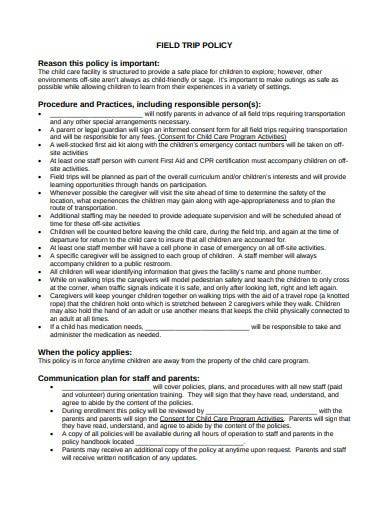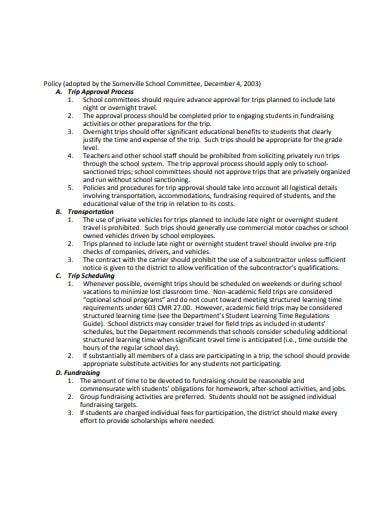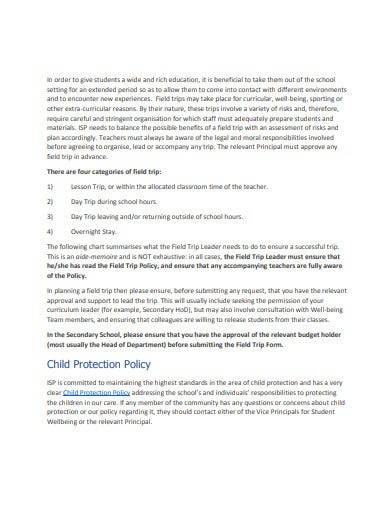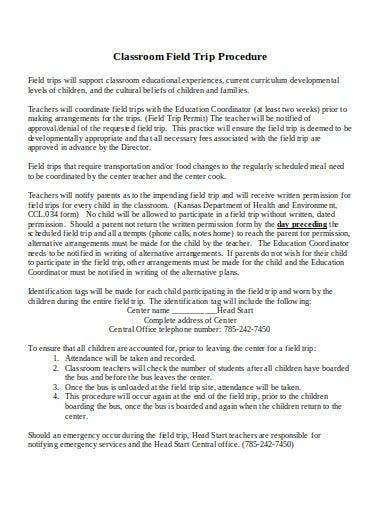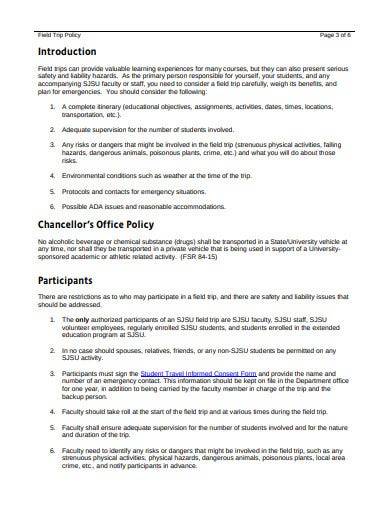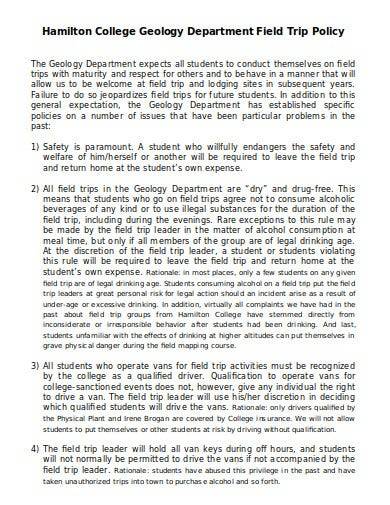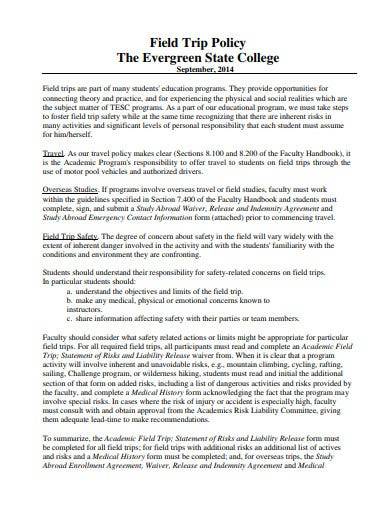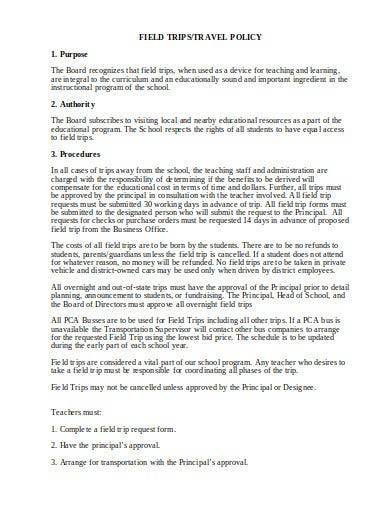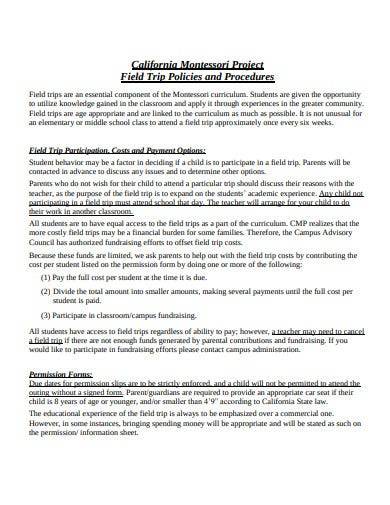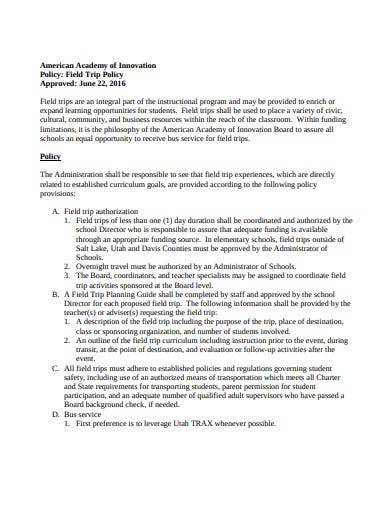Learning should not only be contained within the four corners of a classroom. It should go beyond those walls to allow the students to appreciate the real deal. Through field trips, students can visualize and relate to the theories taught to them in school. While field trips make wonderful learning experiences, it’s also a lot of work. But, if you need help, you can turn to the field trip policy samples in this article. The policy samples will help you learn about what the policy is all about and figure out how to make one for an upcoming field trip itinerary.
FREE 10+ Field Trip Policy Samples & Templates
1. Tip Out Policy Template
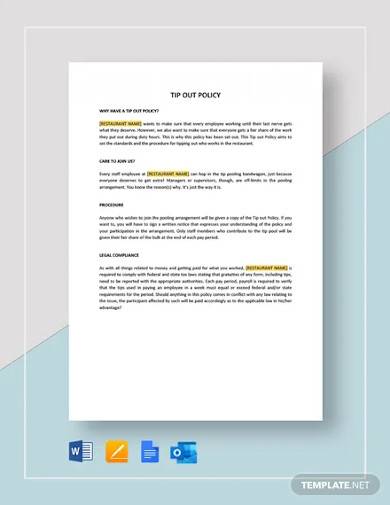
2. Field Trip Policy Template
3. Sample School Field Trip Policy
4. School Field Trip Policy Template
5. Classroom Field Trip Policy Procedure
6. Sample Field Trip Policy Template
7. College Department Field Trip Policy
8. Simple Field Trip Policy Template
9. Travel/Field Trip Policy Template
10. Sample Field Trip Policies and Procedures
11. Formal Field Trip Policy Template
What Is a Field Trip Policy?
A field trip policy is a set of rules that are meant to be followed to ensure a safe educational journey. It directs participants on how to behave on a field trip. A field trip is usually sponsored by a school district or college, which makes the policies applicable to all participants. It is part of the academic curriculum, so whether you are in middle school or in college, you still have the chance to go on a field trip. As part of a field trip policy, students need to have their permission slips signed by their parent or guardian before they can join. It works like an agreement form or a sample waiver. For younger children, they must be accompanied by their parent or a chaperone who is of legal age.
How to Make a Field Trip Policy
The tricky part about having a policy is making sure that it is strictly followed. You may have a well-written field trip policy, but without an effective implementation plan, it’s all worthless. Here are a few tips on what you can do to make your field trip policy work.
1. Require a Signed Permission Slip
Permission slips or consent forms or waiver forms are essential. You’ll need it even if it’s a college field trip. When it’s signed, it means that the parents/guardians of the student understand what the trip is about. It’s also a confirmation that they give their child consent to join the activity. There are downloadable consent form templates and waiver form samples online, so producing the shouldn’ be so hard.
2. Use a Checklist
To ensure the safety of your trip, you’ll need a field trip safety checklist. List everything that you need to do or followed in a checklist template. Use it before, during, and after the trip. The checklist can be your personal tool, or you can share it with the students and staff during the trip.
3. Follow Safety Measures
We know that safety is a priority, but when students get excited, they won’t remember these safety measures. So as the temporary guardian, you’ll need to find ways to instill the field trip safety measures to the students. An example is reminding them to stay with the group or don’t go with strangers.
4. Brief the Students Before Leaving
You must discuss the school’s field trip policy before you start the journey, whether it be in the classroom or on the bus. Allot a couple of minutes for the discussion. Aside from the field trip policy, also set proper expectations and tell them of the travel itinerary.
5. Bring a Partner or a Co-Teacher
Having a partner with you on a field trip will be helpful. They can help you ensure the safety of the students, especially when you’re dealing with the little ones. Your partner can also give you recommendations for the field trip to make it more exciting and educational.
FAQs
What things are needed before a field trip?
There are certain things that a trip facilitator must prepare before the day of the travel. These things must be done or collected beforehand to ensure that the entire trip goes smoothly. Having the following will also make the field trip safer for all the participants.
- Provide the students with send home permission slips or consent form.
- Include an informal letter detailing the said activity. It must be addressed to the parents or guardians.
- Bring chaperones. Once you’ve decided on who your chaperones will be, send them a separate informal letter with instructions or with a list of their duties and responsibilities.
- Prepare color-coded name tags for all participants.
- Bring a backpack and put there everything you need for the trip.
What are the dos and don’ts during a field trip?
To have a safe field trip, here are some dos and don’ts that you’ll need to remember:
- Do travel with a partner or with additional school staff.
- Do leave a file to the school faculty with the list of all trip participants, bus number, flight numbers, etc.
- Do save school and emergency phone numbers on your cell phone.
- Do set proper expectations.
- Do label all luggage, bags, instruments, etc.
- Don’t let students without a signed permission slip to join the activity.
- Don’t consume alcoholic beverages during the trip.
- Don’t put the student’s life at risk.
- Don’t smoke in front of or near the students.
- Don’t forget to bring enough amount of emergency cash.
As a responsible field trip facilitator and teacher, one must show a good example to the students. As the saying goes,” A good follower is a good leader.” On a field trip, it all starts with the teacher following the provided field trip policies, and the rest of the class will surely follow.
Related Posts
FREE 18+ Sample Trip Reports in MS Word Apple Pages | PDF
FREE 7+ Field Note Samples in MS Word PDF
FREE 6+ Sample Tour Reservation Forms in PDF MS Word
FREE 8+ Board Memo Templates in MS Word PDF
FREE 14+ Sample Trip Reports in MS Word Apple Pages | Google ...
FREE 7+ Sample General Liability Release Forms in MS Word PDF
FREE 25+ Sample Trip Reports in MS Word PDF | Google Docs ...
FREE 27 Sample Claim Forms in MS Word
FREE 8+ Sample Travel Authorization Forms in PDF MS Word
FREE 10+ Sample Liability Waiver Forms in MS Word PDF
FREE 9+ Travel Agent Job Description Samples in MS Word PDF
FREE 7+ Construction Field Report Samples in PDF MS Word
FREE 7+ General Release of Liability Form Samples in MS Word ...
FREE 9+ Sample Release of Liability Forms in MS Word PDF
FREE 10+ School Proposal Samples in MS Word Pages | Google ...

